|
|
|
|
|
|
 |
|
|
|
|
|
|
|
|
|
|
|
|
|
|
|
 |
|
|
The team of Franklin and Eleanor Roosevelt during the Roosevelt presidential era was a powerful one. Eleanor changed the limited role of the First Lady into that of assistant to the President. She traveled widely, inspecting educational facilities, institutions, and places of work. She reported back to FDR with recommendations that she felt were needed to improve intolerable conditions. She used her position to bring about social reform. This included a syndicated newspaper column, My Day, which she wrote from 1936 until 1962. She was the first and only First Lady to hold regular press conferences with the women members of the White House Press Corp.
|
|
|
|
|
|
|
|
|
 |
|
 |
Take a virtual reality tour of her home office |
|
|
|
Mrs. Roosevelt took a public stand on civil rights when it was not a popular cause. Over 25 years before legislation was initiated, she spoke out for government support of equal opportunity in education, jobs, and housing. She firmly believed that equality and justice for all were the cornerstones of democracy. Her efforts resulted in an executive order banning discrimination based on race, color, or national origin in industries with government contracts for war production. These protections extended to women employed in war industries.
|
|
|
|
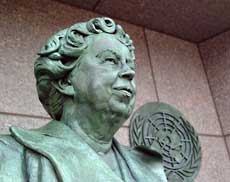 |
|
Eleanor Roosevelt
by Neil Estern, FDR Memorial
Washington, DC
|
|
|
|
 |
|
|
In 1945, President Truman appointed her a delegate to the newly founded United Nations. She chaired the Commission on Human Rights that drafted the Universal Declaration of Human Rights. It was adopted by the General Assembly in December 1948. Eleanor Roosevelt said this was her proudest achievement. The document that began, "All human beings are born with equal and inalienable rights and fundamental freedoms..." became the basis of many constitutions worldwide.
|
|
|
 |
|
|
 |
|
|
|
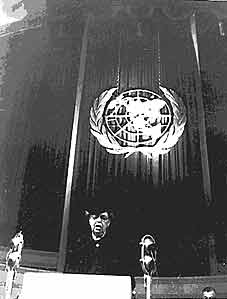 |
|
Eleanor Roosevelt at United Nations meeting in London, England, 1946
FDR Library 09-2434
|
|
|
|
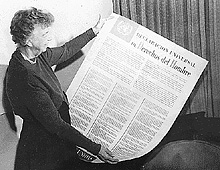 |
|
Eleanor Roosevelt and United Nations 'Universal Declaration of Human Rights' in Spanish text, 1949
FDR Library 09-2456
|
|
|
|
|
 |
|
|
|
|
|
 |
|
| Click either slide icon to start a slide show. Close that window to end the slide show. |
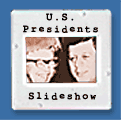 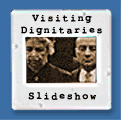 |
|
|
|
After FDR's death, Eleanor Roosevelt became even more vocal about ensuring equal justice for all. She wanted desegregation in housing, education, and all public facilities to be national priority. She increasingly felt that discrimination was both a national and international problem that had to be addressed.
|
|
|
|
 |
|
|
|
|
|
 |
|
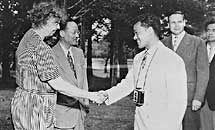 |
|
Eleanor Roosevelt hosting UNESCO visit to Val-Kill in Hyde Park, NY, 1948
FDR Library 09-2447
|
|
|
 |
|
|
 |
|
 |
|
|
Click buttons above for more images.
|
|
|
|
|
|
|
|
|
|
|
|
|
|
|
|
|
|
|
|
|
|
|
|
|
|
|
|
|
|
|
|